Edie Melson's Blog, page 23
February 25, 2025
How to Create a Powerful Writer’s Quote
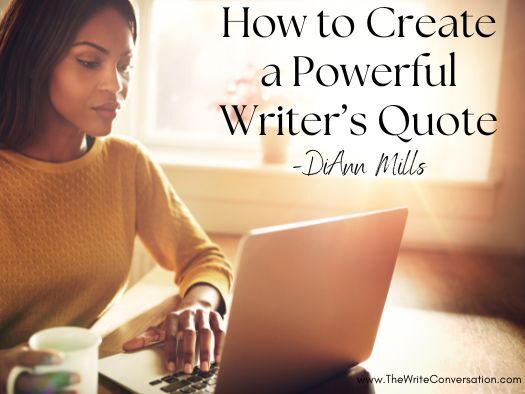
by DiAnn Mills @DiAnnMills
We’ve all read powerful writer quotes that inspire, encourage, and motivate us to work harder for producing a better manuscript. Those quotes can jolt us from writer’s block, personal setbacks, harsh criticism, self-doubt, and a host of other brick walls that prevent us from writing our best.
Often, we read a quote about writing and publishing . . . and feel a bit envious.
Why didn’t I write that quote? It says exactly how I feel.
Dear friend, you can devise a powerful quote that is uniquely and writerly yours.
7 Steps to Creating a Writer’s Quote
1. What are you most passionate about in the world of writing, publishing, marketing and promotion?Where our emotions dwell is where we can mine the perfect quote.What words describe how you internalize the joy, victories, challenges, and defeats of the writing process?Are your feelings raw, symbolic, fresh, or emotional?
2. Are you an introvert or an extrovert? This aspect helps establish your point of view for writing.Introverts are comfortable working alone. This includes entertainment and social events. Introverts observe things happening.Extroverts are happiest when with people. They enjoy social gatherings and thrive on interaction and expression. Extroverts make things happen.A mix of introverted and extroverted traits means certain stimuli require specific responses. For example, most writers are introverts but may enjoy teaching the craft. They come alive and love every minute of it. When the event is over, introverts crash. When the writer is an extrovert, the mental stimulation is invigorating.
3. Establish an aspect of writing that fits the following:What part of the writing process do you enjoy the most?What part of the writing process challenges you the most?What part of the writing process do you enjoy now but at one time challenged you to tears?
4. Take the information from step 1 and apply the following:List verbs that fit your voice.List nouns that fit your voice.List emotions that fit your voice.
5. Arrange and rearrange the information gathered from steps 1, 2, 3, and 4.Create three sample writer quotes.Create three more writer quotes, each time pulling out the strongest statement.Choose the top three quotes and put them aside for one week.
6. At the end of one week, re-read these instructions and carefully edit your top three quotes.Which quote has the most impact?Which quote stands out as if you were speaking?Which quote would you proudly share with other writers?
7. Share with writers who care about you and will provide honest feedbackTake notes of what is said that encourages or challenges you about the quote.Are the suggestions consistent?Edit the quote until you and your writerly friends are pleased.
Developing a writer quote takes a chunk of our hearts because we use transparency and what we treasure about the craft to inspire, motivate, and encourage others.
I challenge you to create your unique writer’s quote that shares your passion for the craft.
TWEETABLEHow to Create a Powerful Writer's Quote from @DiAnnMills on @EdieMelson (Click to Tweet)
 DiAnn Mills is a bestselling author who believes her readers should expect an adventure. She creates action-packed, suspense-filled novels to thrill readers. Her titles have appeared on the CBA and ECPA bestseller lists; won two Christy Awards; and been finalists for the RITA, Daphne Du Maurier, Inspirational Readers’ Choice, and Carol award contests.
DiAnn Mills is a bestselling author who believes her readers should expect an adventure. She creates action-packed, suspense-filled novels to thrill readers. Her titles have appeared on the CBA and ECPA bestseller lists; won two Christy Awards; and been finalists for the RITA, Daphne Du Maurier, Inspirational Readers’ Choice, and Carol award contests. She is the former director of the Blue Ridge Mountain Christian Writers Conference, Mountainside Marketing Retreat, and Mountainside Novelist Retreat with social media specialist Edie Melson. Connect here: DiAnnMills.com
Published on February 25, 2025 22:00
February 24, 2025
Dipping the Quill Deeper: Humble Beginnings (Part 1)
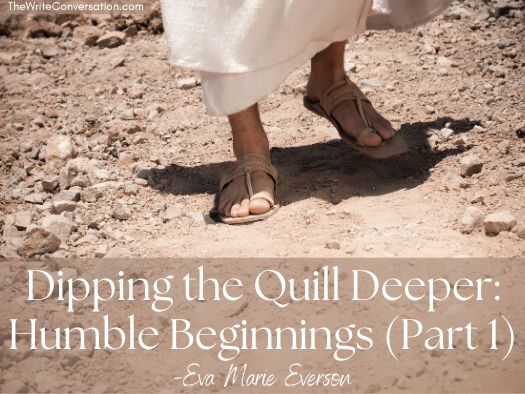
by Eva Marie Everson @EversonAuthor
Thanks in part to The Chosen—a groundbreaking historical seven-season drama based on the life of Jesus Christ, as seen through the eyes of those who knew Him—viewers have put faces on the names of Jesus’ disciples and followers. For example, I can hardly read the Book of Revelation without imagining George H. Xanthis as John, standing in the presence of so much mystery and wonder. When I read the Book of Matthew, I picture Paras Patel jotting notes in his “book.” When I read the story of Mary Magdeline, I imagine the lovely Elizabeth Tabish. And, naturally, I cannot ever hear the name “St. Peter” without thinking of Shahar Isaac. In many ways, The Chosen has reminded us that the men and women we read about in the Bible were real, flesh-and-blood people.
Because of this, when I read the Book of John’s opening chapter, I naturally envision Noah James (Andrew) standing near John the Baptist (David Amito) as he enraptures a crowd along the banks of the Jordan River. Then, when Jesus (Jonathan Roumie) passes by, John looks past the crowd and declares, “Look! The Lamb of God!” (John 1:36)
The passage goes on to say that two of John’s disciples (one we know to be Andrew, the other I suspect may have been John) left the baptizer on the riverbank to follow behind Jesus.
Turning around, Jesus saw them following and asked, “What do you want?” They said, “Rabbi” (which means “Teacher”), “where are you staying?
“Come,” he replied, “and you will see.” (John 1:38,39)
Can you imagine this? The Creator of the Universe, the One who had been prayed for, anticipated, and hoped for is standing before you, dark eyes shining, brow lifted in question, a slight smile curling his lips. And your relationship with Him begins with a simple question: What do you want?
Humble Beginnings
Let’s say the two men who are about to follow Jesus were, in fact, Andrew and John.
Andrew, the brother of Peter.
John, the brother of James.
Both Jewish fishermen in first century Roman-ruled Israel. Even though fishing was a rather large trade, this was not an easy profession. At times, it was an unrelenting profession. By no means did one become rich and famous as a fisherman throwing nets that required constant maintenance, over a boat into the fresh waters of Sea of Galilee. Then those caught fish had to be sorted—some were worth more than others, some could be eaten, and some could not (according to Jewish laws and customs). Some had to be returned to the sea.
Jewish fishermen in the days of Jesus . . . of Peter and Andrew . . . of James and John . . . had to be filled with courage, patience, and determination.
Being Jewish in a Roman-controlled land and being fishermen, didn’t necessarily rank high on anyone’s social ladder either. Yet, here they stood, two ragtag fishermen, before the Son of God.
What do you want?
Where are you staying?
They could have asked Him for anything—wealth, freedom from Rome, a catch of fish beyond imagination—but being with Him was the most important thing.
Andrew and (perhaps) John would not have had any idea where their relationship with the Rabbi would take them. They’d not know that two thousand years later nearly the entire world would talk about them . . . that books would be written about them . . . that paintings depicting them would hang in homes and businesses and famous museums. . . or that a television series would tell their stories.
And certainly, not even in their wildest dreams, would they have imagined that following This Man would change their lives in the way it did and that their witness, both spoken and written, of who He was . . . and is . . . and has always been, would change the world.
Humble beginnings.
Now here’s a question for you: as writers, what do you want? A best seller? To be famous? Or to be with Jesus?
TWEETABLEDipping the Quill Deeper: Humble Beginnings (Part 1) from @EversonAuthor on @EdieMelson (Click to Tweet)
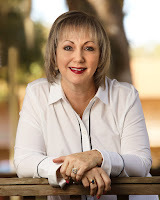 Eva Marie Everson is the CEO of Word Weavers International, the director of Florida Christian Writers Conference, and the contest director for the Blue Ridge Mountains Christian Writers Conference. She is the author of almost 50 books, both fiction and nonfiction. Her next novel, Beth Bettencourt, is set for release in 2026 (Kregel). To know more about Eva Marie (or to be added to her Southern newsletter), you can connect with her at www.EvaMarieEversonAuthor.com
Eva Marie Everson is the CEO of Word Weavers International, the director of Florida Christian Writers Conference, and the contest director for the Blue Ridge Mountains Christian Writers Conference. She is the author of almost 50 books, both fiction and nonfiction. Her next novel, Beth Bettencourt, is set for release in 2026 (Kregel). To know more about Eva Marie (or to be added to her Southern newsletter), you can connect with her at www.EvaMarieEversonAuthor.com
Published on February 24, 2025 22:00
February 23, 2025
In God's Time: The Rhythm of a Writer’s Journey
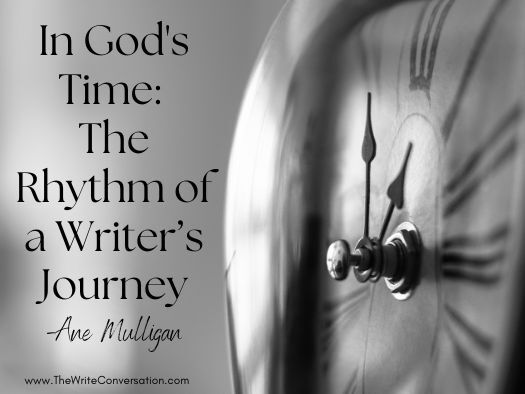
by Ane Mulligan @AneMulligan
When I started writing novels, I was already a published playwright. I knew … uh, learned how to write realistic dialogue. I had a good idea for Biblical novel. I was absolutely sure it would be published. After all, what's not to love about a good Biblical novel?
A lot apparently. I learned that dialogue isn't all I needed to know, and at that time, Biblical novels weren't selling—or being picked up by publishers.
So, I settled in to learn. Along the way, I developed a library of writing books. I read them and applied what I learned. I developed relationships with other writers, some of whom became close friends and critique partners. One has been a CP since the early 2000s.
As my writing improved, I began to submit to publishers. I studied the Christian Writers Market Guide and followed each publisher's guidelines for submissions. I got a lot of rejection then I began to get interest.
During this time, I started going to writers conferences, too. I met25 agents and editors and formed relationships. I built a platform during these years.
But even with all that—doing everything right—I was always the proverbial bridesmaid. What was wrong?
Finally, and I've told this story before, I got past editorial committee. My book went to pub board—where the marketing people scrutinize your and your book's marketability. How big is your platform? Was the book one that would sell? It was! The editor emailed me, telling me they were slating my book for the following quarter, since they already had one by one of their established authors for this quarter.
I didn't care. I was being offered a contract! But the following week, the editor retired, and the company wiped her hard drive clean.
The hard drive with my book on it.
And that's when I realized God was saying, "No. Not now. Not there."
Even when my writing was good enough, I had the platform and marketability, and all the publishing relationships, I forgot God's timing. I finally saw it.
I relaxed and continued to write. Another six years would pass before I actually signed a contract. But by that time, I had three books in the series completed, and the fourth well underway.
There's something to be said about not having a tight deadline.
The thing is, if I had published early, I might have missed all the great relationships I've built over the years.
Don't forget to include God's timetable in your plans for your writing journey. Especially now when Indie publishing is available to us. If you put your work out there too soon, you won't get the results you hoped for.
My advice?
Pray for God to show you His timingBuild relationshipsPray for God's timetable to be fulfilledJoin a professional writer's organizationPray over your writingGo to writers conferencesPray for those who your writing will reachLearn and apply what you learn
If you publish before God's time for you, the people your work is supposed to reach and help may not be ready to receive it. Remember: To everything there is a season, and a time to every purpose under heaven. Ecclesiastes 3:1
TWEETABLEIn God's Time: The Rhythm of a Writer's Journey from @AneMulligan on @EdieMelson (Click to Tweet)
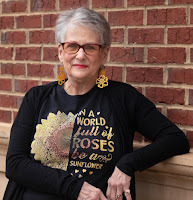 Ane Mulligan lives life from a director’s chair, both in theatre and at her desk creating novels. Entranced with story by age three, at five she saw PETER PAN onstage and was struck with a fever from which she never recovered—stage fever. One day, her passions collided, and an award-winning, bestselling novelist emerged. She believes chocolate and coffee are two of the four major food groups and lives in Sugar Hill, GA, with her artist husband and a rascally Rottweiler. Find Ane on her website, Amazon Author page, Facebook, Instagram, Pinterest, The Write Conversation, and Blue Ridge Conference Blog.
Ane Mulligan lives life from a director’s chair, both in theatre and at her desk creating novels. Entranced with story by age three, at five she saw PETER PAN onstage and was struck with a fever from which she never recovered—stage fever. One day, her passions collided, and an award-winning, bestselling novelist emerged. She believes chocolate and coffee are two of the four major food groups and lives in Sugar Hill, GA, with her artist husband and a rascally Rottweiler. Find Ane on her website, Amazon Author page, Facebook, Instagram, Pinterest, The Write Conversation, and Blue Ridge Conference Blog.
Published on February 23, 2025 22:00
February 22, 2025
What Is the Difference Between the Sacred and the Secular in Writing?
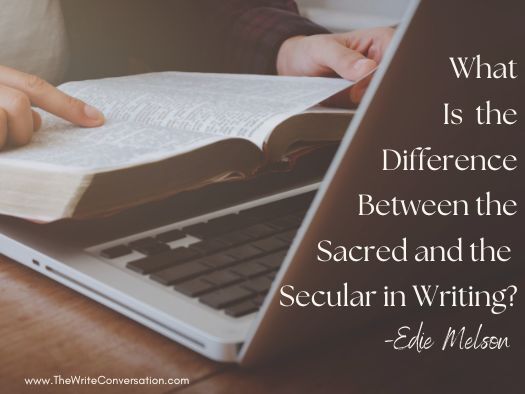
by Edie Melson @EdieMelson
Whatever you do, work at it with all your heart, as working for the Lord, not for human masters… It is the Lord Christ you are serving. Colossians 3:23-24
Even though I’m a Christ-follower, I must admit I'm struggling with a concept.
I have a little bit of an issue with the idea of Christian books and Christian writers. I can hear the gasping and unsubscribing even as I write this. You are welcome to disagree. Actually I hope that you’ll take time to weigh in on this subject. But before you do, let me explain. As far as Christian books, there’s no way a book can be Christian, in that Jesus didn’t die so it could live. It’s like saying I have Christian countertops or a Christian chair. We’ve just become so accustomed to hearing the phrase we accept it at face value.
I get the reason for the distinction. It’s easier for the reader to know the focus and/or content of a particular book if it’s labeled Christian. But, at least in my mind, the distinction is an invisible line. Who decides what is considered Christian and what isn’t? These are some heavy issues, and they’re dogging the Christian publishing industry right now.
I believe the truth of the matter is subjective.
NOT, the truth of who Christ is and what He did for us.
That is a foundational truth we can base our lives upon. The subjective part that I’m referring to is defining what the criteria is that designates a book as Christian. Is it only stories with a gospel message?Is it stories where the characters are believers?Is it only redemptive stories?Is it only nonfiction?Is it biblical fiction?
In the Bible we find all kinds of books, from poetry to biography to a book that never even mentions God (Book of Esther). For years, Christian books have been found in Christian book stores. While I don’t have anything overtly against these stores, I find them to be sanitized places, full of lots of Jesus Junk and very few actual books. They also tend to be extremely female oriented—heavy on the inventory of tea pots, doilies and jewelry. The reason for this feminine focus comes from the argument that most book buyers are women, therefore the shopping experience should be female focused. To me, that’s a self-defeating prophesy because very few men will shop in these girlie-girl surroundings.
But let’s leave this discussion and move to the designation of Christian writers.
It’s easy to ask what makes a writer a Christian, it’s the fact that they’ve accepted Jesus Christ as their Lord. I have no problem with that. But let’s go a bit further. We take it to mean that the so-designated writer, writes only Christian books and/or other Christian content. Again, who decides what is Christian and what isn’t?
Beyond that, what other professions designate themselves as Christian __________? Do we refer to Christian plumbers, or Christian barbers, or even Christian chefs? Do we serve Christian food, live in Christian houses or have Christian plumbing? Of course not. So why Christian books?
To carry this conversation even further—God created the world in which we live. If I'm writing about this world from the viewpoint of someone who believes in God—isn't that Christian?
As a believer, my goal is to write things that won’t shame my Lord. It’s at once that simple and that complicated.
I’ve shared my thoughts, now I’d love to hear yours.
TWEETABLEWhat Is the Difference Between the Sacred and the Secular in Writing? From @EdieMelson (Click to Tweet)
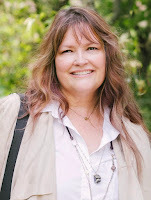 Edie Melson is a woman of faith with ink-stained fingers observing life through the lens of her camera. No matter whether she’s talking to writers, entrepreneurs, or readers, her first advice is always “Find your voice, live your story.” As an author, blogger, and speaker she’s encouraged and challenged audiences across the country and around the world. Her numerous books reflect her passion to help others develop the strength of their God-given gifts and apply them to their lives.Connect with her on her website, through Facebook, Twitter and on Instagram.
Edie Melson is a woman of faith with ink-stained fingers observing life through the lens of her camera. No matter whether she’s talking to writers, entrepreneurs, or readers, her first advice is always “Find your voice, live your story.” As an author, blogger, and speaker she’s encouraged and challenged audiences across the country and around the world. Her numerous books reflect her passion to help others develop the strength of their God-given gifts and apply them to their lives.Connect with her on her website, through Facebook, Twitter and on Instagram.
Published on February 22, 2025 22:00
February 21, 2025
Roles in Conflict: A Unique Approach to Developing Story Ideas
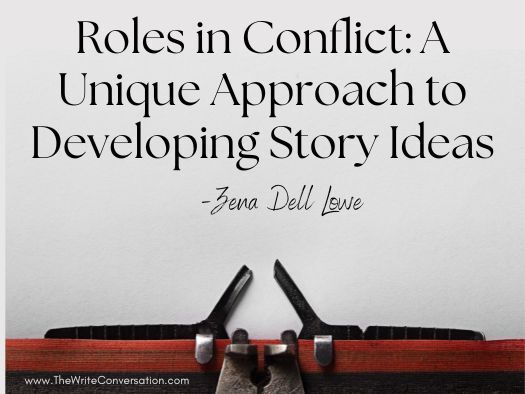
by Zena Dell Lowe @ZenaDellLowe
When we talk about developing story ideas, we often focus on arenas, themes, or the classic “what if” premises. And while those are all valid starting points, there’s another approach that doesn’t get nearly enough attention, and it’s one of my favorites. Full disclosure: I learned this method from Jeffrey Sweet’s book, “The Dramatists Toolkit.” He calls it Roles in Conflict.
What Is "Roles in Conflict"?
At its core, this concept revolves around a character who is torn between two or more roles that are deeply important to them but are ultimately incompatible. These roles demand conflicting things from the character, and the tension between them creates a rich, dynamic internal conflict. It’s about being forced to choose when doing both is impossible—and the fallout that comes from that choice. Let’s look at some examples.Classic Examples: Hamlet and Heat
In Shakespeare’s Hamlet, the titular character embodies roles in conflict. He’s a son with a duty to avenge his father’s murder, but that role clashes with his responsibilities as a prince and his complicated loyalty to his mother. Everywhere you turn, Hamlet’s roles pull him in opposing directions, forcing him to wrestle with impossible decisions. His torment is the heart of the play.
Now, fast forward to the modern era with Michael Mann’s Heat. Robert De Niro’s character is a career criminal who lives by a strict code: never get attached to anything you can’t walk away from in thirty seconds flat. But then he meets a woman he loves, and suddenly his role as a thief is in direct conflict with his desire for a meaningful relationship. The tension builds throughout the film, culminating in his heartbreaking choice. He can’t have both.
Why Roles in Conflict Works
A story that uses roles in conflict automatically creates a complex, layered protagonist. These characters are deeply torn, often trying—and failing—to balance their competing roles. This struggle naturally builds tension, drives the narrative forward, and leads to emotionally impactful moments. It also creates a clear structure for your story: the character’s arc is defined by their journey toward that inevitable moment when they must choose.More Examples Across Genres
Let’s expand beyond Hamlet and Heat to see how this concept plays out in other stories.Wonder Woman 1984: While the movie had its flaws, it touched on a powerful roles-in-conflict premise. Diana wants to be Wonder Woman, the savior humanity needs, but she also longs to be with the man she loves. Ultimately, she has to choose between the two.Bosch: In the TV series, detective Harry Bosch’s relentless pursuit of justice puts him at odds with his roles as a father and an employee. His inability to compromise costs him personally and professionally, but it’s also what makes him heroic.Breaking Bad: Walter White begins as a sympathetic character trying to provide for his family after being diagnosed with cancer. But his role as a family man soon conflicts with his growing role as a criminal mastermind. Over time, his choices transform him into someone unrecognizable—the complete antithesis of the good man he once was.My Best Friend’s Wedding: Even comedies can use this principle. Julia Roberts’ character is torn between being a good friend and pursuing the man she loves. She can’t do both, and her attempts to navigate this conflict drive the humor and heart of the film.
How to Use This in Your Story
If you’re intrigued by this approach, here’s how to apply it:1. Identify the Roles: What two (or more) roles does your character have that are deeply important to them? These should be roles that define who they are or who they want to be.2. Establish the Conflict: How are these roles incompatible? Create situations where the demands of one role directly clash with the demands of the other.3. Build the Tension: Show your character trying to balance these roles, failing, and suffering the consequences. Each attempt to “do it all” should heighten the stakes.4. Force the Choice: The climax of your story should hinge on the moment when the character can no longer avoid choosing. Their decision should be meaningful, irreversible, and emotionally charged.5. Explore the Fallout: How does the choice reshape your character’s life and identity? What’s gained? What’s lost? This is where your story’s emotional resonance will shine.
Why This Matters
Stories built around roles in conflict resonate deeply because they tap into universal human experiences. We’ve all felt the pull of competing responsibilities and values. Watching a character wrestle with these struggles and make a choice—for better or worse—invites us to reflect on our own lives. It makes for compelling, relatable storytelling.
So, if you’re looking for a fresh way to develop a story idea, try starting with roles in conflict. It’s an approach that guarantees a layered protagonist, high stakes, and an emotionally satisfying arc. And who knows? It might just become your new favorite way to brainstorm.
TWEETABLERoles in Conflict: A Unique Approach to Developing Story Ideas from @ZenaDellLowe on @EdieMelson (Click to Tweet)
 Zena has worked professionally in the entertainment industry for over 20 years as a writer, producer, director, actress, and story consultant. Zena also teaches advanced classes on writing all over the country. As a writer, Zena has won numerous awards for her work. She also has several feature film projects in development through her independent production company, Mission Ranch Films. In addition to her work as a filmmaker, Zena launched The Storyteller’s Mission with Zena Dell Lowe, a podcast designed to serve the whole artist, not just focus on craft. In 2021, Zena launched The Storyteller’s Mission Online Platform, where she offers advanced classes and other key services to writers. Zena loves story and loves to support storytellers. Her passion is to equip artists of all levels to achieve excellence at their craft, so that they will truly have everything they need to change the world for the better through story.
Zena has worked professionally in the entertainment industry for over 20 years as a writer, producer, director, actress, and story consultant. Zena also teaches advanced classes on writing all over the country. As a writer, Zena has won numerous awards for her work. She also has several feature film projects in development through her independent production company, Mission Ranch Films. In addition to her work as a filmmaker, Zena launched The Storyteller’s Mission with Zena Dell Lowe, a podcast designed to serve the whole artist, not just focus on craft. In 2021, Zena launched The Storyteller’s Mission Online Platform, where she offers advanced classes and other key services to writers. Zena loves story and loves to support storytellers. Her passion is to equip artists of all levels to achieve excellence at their craft, so that they will truly have everything they need to change the world for the better through story.To find out more about Zena or her current courses and projects, check out her websites at WWW.MISSIONRANCHFILMS.COM and WWW.THESTORYTELLERSMISSION.COM
Published on February 21, 2025 22:00
February 20, 2025
Twelve Reasons Why I Love Being a Writer
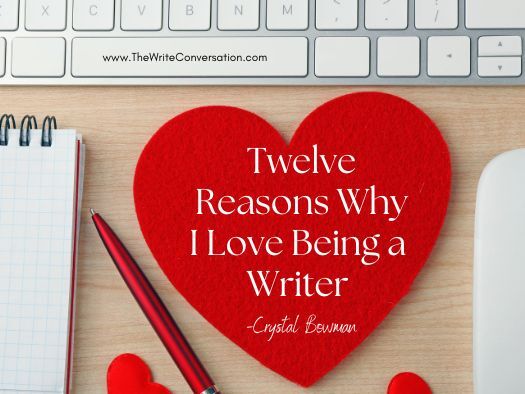
by Crystal Bowman
Though Valentine’s Day has come and gone, February is known as the month of love. Here are twelve reasons why I love being a writer: 1. I can work from home in comfy clothes and don’t have to drive in rush-hour traffic.2. I can take a break whenever I want to and go for a walk or clean my refrigerator. 3. I can go to writers’ conferences to learn from the pros and schmooze with amazing people who understand the joys and challenges of being a writer. 4. I have lots of author friends.5. I have editors who make me a better writer.6. I get to visit schools and share my books with children and teachers.7. Kids think I am famous (LOL).8. I can autograph books and sell them or give them as gifts. 9. I find my books in unexpected places like airports and gift shops. 10. I can coach and mentor aspiring authors who want to learn from my experiences. 11. I can tell my readers how much God loves them and share the message of salvation with people I will never meet. 12. I can pray and ask God to guide my mind, my words, and my message.
How about you? What do you love about being a writer?
Happy Love Month!
TWEETABLETwelve Reasons Why I Love Being a Writer from Crystal Bowman on @EdieMelson (Click to Tweet)
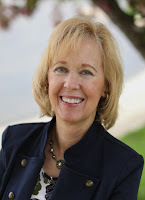 Crystal Bowman is an award-winning, bestselling author of more than 100 books for children and families. She also writes lyrics for children’s piano music and is a monthly contributor to Clubhouse Jr. Magazine, Arise Daily, and Christian Children's Authors. She enjoys coaching children's writers as well as teaching at writers conferences. When she is not writing or speaking, she likes going for walks and spending time with her huggable grandkids. She and her husband live in Michigan and Florida and try to avoid snowstorms.
Crystal Bowman is an award-winning, bestselling author of more than 100 books for children and families. She also writes lyrics for children’s piano music and is a monthly contributor to Clubhouse Jr. Magazine, Arise Daily, and Christian Children's Authors. She enjoys coaching children's writers as well as teaching at writers conferences. When she is not writing or speaking, she likes going for walks and spending time with her huggable grandkids. She and her husband live in Michigan and Florida and try to avoid snowstorms.WWW.CRYSTALBOWMAN.COMWWW.FACEBOOK.COM/CRYSTAL.BOWMANWWW.FACEBOOK.COM/CRYSTALJBOWMANWWW.INSTAGRAM.COM/CRYSTALBOWMANAUTHOR
Published on February 20, 2025 22:00
February 19, 2025
Rekindle Your Love of Writing with These 8 Tips
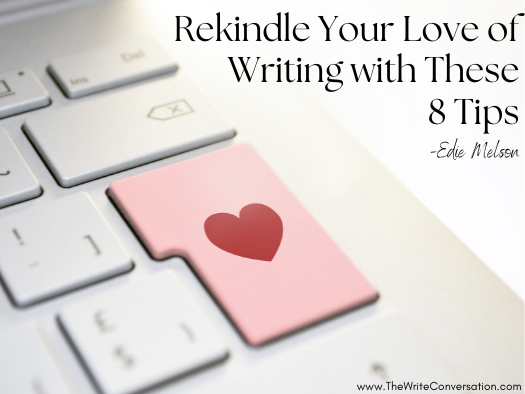
by Edie Melson @EdieMelson
Between deadlines, edits and rejections it’s easy to fall out of love with our writing. It can get so bad that we begin to dread sitting down at the keyboard.
When that happens to me my mind begins to reprioritize my life. I can suddenly find a million things more important than putting my rear end in the chair and pounding out words.
When I begin arguing with myself, stating that clean baseboards are more important than word count goals, I know I’m in trouble.
Today, in honor of the month of love, I want to share some tips that help me fall back in love with writing.
8 Ways to Rekindle Your Love of Writing
1. Realize that love is a choice—not an emotion. I know that sounds more like marriage counseling than advice for writers, but truth is truth. I’ve made a commitment to what it means to be a writer, and the means not quitting when times get bad.
2. Stop the negative talk. The more you bad-mouth writing—even if it’s just in your mind—the more you’ll begin to believe what you’re hearing. This is an important step in returning to that bloom of first love. Don’t taper off the negativity, just stop . . . immediately!\
3. Make a list of all the things that made you fall in love in the first place. There was a reason you answered the siren call of words. It’s up to you to remember it and then—write it down.
4. Set the mood. Just like a marriage is better with an occasional candle-lit dinner, writers also need a little romancing. Choose someplace you love and write there. It could be a coffee shop, or a cozy chair by the fireplace at home. Then add a little mood music. Even if you don’t usually write to music, sometimes the change can be just the spark to rekindle the love.
5. Make Writing a priority again. When we take something for granted, we tend to push it further down on our priority list. It's time to remember why you started writing and re-establish it as a major priority.
6. Dress it up—your writing space that is. This may mean sprucing up your office, investing in a new writing program (Scrivener anyone?) or it might just be a new bit of wall art. It doesn’t have to be expensive, just make sure it’s writing related.
7. Add a little mystery. Start your writing time with a writing prompt. If you’ve never used one before, you’re in for a treat. It’s something that gets your creativity flowing. You can type writing prompts into a search engine on the Internet and get thousands of them.
8. Rekindle the romance. Revisit the things you love to write. If you’re working on book revisions, take time to write a poem, or short story, or devotion. Or maybe just spend some time with old-fashioned pen and paper, journaling.
These are the things I do when I need to fall back in love with the written word. What tips do you have. Be sure to share them in the comments section below.
Don’t forget to join the conversation!Blessings,Edie
TWEETABLERekindle Your Love of Writing with These 8 Tips from @EdieMelson (Click to Tweet)
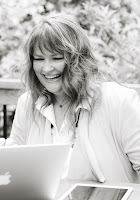 Edie Melson is a woman of faith with ink-stained fingers observing life through the lens of her camera. No matter whether she’s talking to writers, entrepreneurs, or readers, her first advice is always “Find your voice, live your story.” As an author, blogger, and speaker she’s encouraged and challenged audiences across the country and around the world. Her numerous books reflect her passion to help others develop the strength of their God-given gifts and apply them to their lives.Connect with her on her website, through Facebook, X and on Instagram.
Edie Melson is a woman of faith with ink-stained fingers observing life through the lens of her camera. No matter whether she’s talking to writers, entrepreneurs, or readers, her first advice is always “Find your voice, live your story.” As an author, blogger, and speaker she’s encouraged and challenged audiences across the country and around the world. Her numerous books reflect her passion to help others develop the strength of their God-given gifts and apply them to their lives.Connect with her on her website, through Facebook, X and on Instagram.
Published on February 19, 2025 22:00
February 18, 2025
Finding Love in Words: 5 Ways to Deepen Your Love for Writing
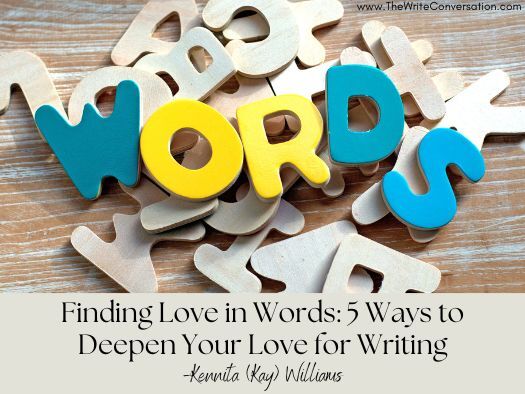
by Kennita (Kay) Williams
Most writers share a common affection we love words, don't we? There is something magical about crafting sentences, shaping ideas, and painting vivid pictures with language. Words hold power, and for those of us who have fallen in love with them, they become a lifelong companion.
For me, words have always been more than just letters strung together. They have been a source of inspiration, clarity, and empowerment. From the time I was a young girl scribbling notes in my journal to becoming a published author, speaker, and thought leader, my love for words has deepened in ways I never imagined.
My love for words began in childhood, where I found solace in storytelling. Whether through books, conversations, or the whispers of wisdom from my elders, I recognized early on that words could shape perspectives, heal hearts, and spark movements.
As I grew, so did my relationship with language. In school, I excelled in writing assignments, not because I had to but because I genuinely enjoyed the process of crafting thoughts into meaning. I found myself drawn to poetry, speeches, and books that challenged my way of thinking.
My love for words took on new meaning in college, where I learned that words were not just for entertainment but for impact. I saw how well-crafted speeches inspired crowds, how written vision statements shaped organizations, and how journaling helped people process emotions. This realization fueled my passion for leadership, storytelling, and guiding others toward clarity.
Now, as a speaker, leadership coach, and author, I use words to empower others. I believe that every writer must learn to communicate effectively, not just to share information but to inspire action. Whether it is through our books, blog posts, or live presentations, our words must be a reflection of the journey you desire your readers to take. My journey began with a simple love for language and has evolved into a powerful tool for transformation. Writing words that ignite transformation is a game-changer! The right words have the power to inspire, challenge, and propel readers toward a breakthrough.
If you are a writer, blogger, or someone who simply enjoys the art of storytelling, you already understand the beauty of words. But like any great love, the relationship between a writer and words must be nurtured.
5 Ways to Deepen Your Love for Words & Grow as a Writer
1. Read Widely and Intentionally
One of the best ways to love words more deeply is to expose yourself to a variety of them. Read books outside of your usual genre. Explore poetry, essays, and classic literature. Pay attention to how great writers structure their sentences, create rhythm, and evoke emotion. The more you read, the more you appreciate the artistry behind well-crafted language.
2. Write Every Day (Even When You Don't Feel Like It)
Love grows through consistency. The more you write, the more natural it becomes. Whether it is journaling, blogging, or simply jotting down ideas, make writing a daily habit. Don't t wait for inspiration. Discipline creates inspiration.
3. Play with Words and Experiment with Style.
Writing does not always have to be serious. Have fun with it! Try writing in different styles short stories, essays, or even humorous pieces. Play with sentence structure, word choice, and tone.
4. Speak Your Words Out Loud
Writing is not just about the visual it is also about the sound. Read your work aloud and listen to the rhythm of your sentences. Great writing has a flow, a melody that makes it compelling.
5. Find a Community That Loves Words as Much as You Do.
If you love words, nurture that love. Read them, write them, speak them, and share them. The more you embrace the beauty of language, the more you will discover the power it holds not just for you, but for those who will one day be moved by your words.
So, keep writing. Keep falling in love with words. And remember, the best stories are the ones that change the world are often the ones still waiting to be told.
TWEETABLEFinding Love in Words: 5 Ways to Deepen Your Love for Writing from Kennita (Kay) Williams on @EdieMelson (Click to Tweet)
Dr. Kennita “Kay” Williams is a Visionary Leadership Coach, Author, Resilience Expert, and Wellness Advocate. Through her Business/Ministry, Clear Vision, she empowers leaders to navigate challenges, gain clarity, and lead with purpose. Dr. Kay’s mission is to inspire wholeness and healing. She can be contacted at www.clearvisionleader.com
Published on February 18, 2025 22:00
February 17, 2025
Four Stages to Channel Our Writing Towards a Greater Purpose

by Katherine Hutchinson-Hayes @KHutch0767
In the journey of writing, we face triumphs and challenges. With each success, there may be moments of rejection and closed doors. Reflecting on our achievements can provide comfort and perspective during these challenging times. Ultimately, recognizing the bigger picture helps us navigate the struggles and victories we encounter, especially when we embrace letting go of perfectionism and trusting the writing process.
As writers, we bear the significant responsibility of communicating our ideas clearly and in a way that deeply resonates with our intended audience. Whether we’re crafting a thought-provoking essay that challenges conventional wisdom, weaving an engaging novel that transports readers into imaginative realms, penning an inspiring article that ignites passion or action, or producing a meticulously crafted blog post that informs and entertains, our goal is to motivate, uplift, and encourage others through the power of our words. By skillfully selecting our language, structuring our narratives, and tapping into the emotions of our readers, we strive to create connections that leave a lasting impression and stimulate meaningful dialogue.
4 Suggestions to Focus Our Writing for Greater Purpose:1. Prioritize Clarity and Humility in Your Message—As writers, we should strive to express our ideas carefully. We must review our content thoroughly to ensure our message comes across clearly and respectfully, honoring the subject.2. Write with Compassion and Empathy—While accuracy is essential, it’s equally vital to approach our writing with understanding and kindness. Our words should uplift and encourage rather than tear down, creating a positive experience for readers.3. Focus on Purpose—Remember that our goal is not merely to impress others but to contribute meaningful insights. We must provide value and honor the truth behind our writing.4. Trust the Process—Let go of the urge to control every aspect of your work. While we may have personal goals and aspirations, trusting the creative process can lead to unexpected opportunities and growth.
As writers, we must remember that our contributions transcend the mere act of putting words on a page; they hold considerable weight in the larger discourse that shapes our culture and society. By embracing and trusting the creative process, we recognize that our work is imbued with layers of meaning and significance that often go beyond initial impressions.
Let’s approach our writing with strong intention, empathy, and thoughtfulness. Each story we tell has the potential to resonate deeply with our audience, prompting reflection and dialogue. By considering the diverse perspectives of those who engage with our narratives, we can craft stories that entertain, enlighten, inspire, and provoke critical thinking. Our goal should be to encourage an enriching exchange of ideas, fostering understanding and connection through the power of storytelling.
May our writing reflect a commitment to clarity and compassion, positively impacting readers and deepening their understanding. By focusing on purpose, we can ensure that our work resonates deeply and meaningfully.
TWEETABLEFour Stages to Channel Our Writing Towards a Greater Purpose from @KHutch0767 on @EdieMelson (Click to Tweet)
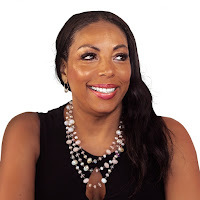 Dr. Katherine Hutchinson-Hayes is a review board member and contributor to Inkspirations (an online magazine for Christian writers), and her writing has been published in Guideposts. Her work in art/writing is distinguished by awards, including the New York Mayor’s Contribution to the Arts, Outstanding Resident Artist of Arizona, and the Foundations Awards at the Blue Ridge Mountains Christian Writer’s Conference (2016, 2019, 2021). She is a member of Word Weavers International and serves as an online chapter president and mentor. She belongs to FWA (Florida Writers Association), ACFW (American Christian Fiction Writers), CWoC (Crime Writers of Color),
Dr. Katherine Hutchinson-Hayes is a review board member and contributor to Inkspirations (an online magazine for Christian writers), and her writing has been published in Guideposts. Her work in art/writing is distinguished by awards, including the New York Mayor’s Contribution to the Arts, Outstanding Resident Artist of Arizona, and the Foundations Awards at the Blue Ridge Mountains Christian Writer’s Conference (2016, 2019, 2021). She is a member of Word Weavers International and serves as an online chapter president and mentor. She belongs to FWA (Florida Writers Association), ACFW (American Christian Fiction Writers), CWoC (Crime Writers of Color),AWSA (Advanced Writers and Speakers Association), and AASA (American Association of School Administrators). She serves on the nonprofit organization Submersion 14 board and the 540 Writer’s Community board and is an art instructor for the nonprofit organization Light for the Future. Katherine hosts the podcast Murder, Mystery & Mayhem Laced with Morality. She has authored a Christian Bible study for women and is currently working on the sequel to her first general market thriller novel. Her thriller A Fifth of the Story will debut in February 2024 through Endgame Press.
Katherine flourishes in developmental editing and coaching writers. She has a twenty-year career in education, leadership, and journalism. Katherine freelances as an educational consultant for charter schools, home school programs, and churches. In this role, she has written and edited curriculum, led program development, and helped manage growth facilitating and public relations.She also works as an editor and book coach through her consulting business. Katherine provides skill, accountability, and professionalism so clients can begin, develop, and finish their writing projects for publication.
Published on February 17, 2025 22:00
February 16, 2025
Using this Year's Literacy Calendar to Plan Your Book Marketing
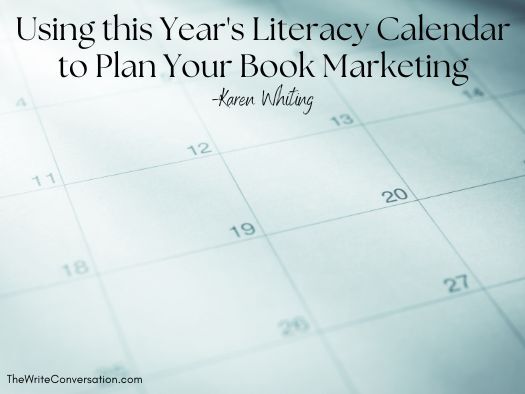
by Karen Whiting @KarenHWhiting
A literary calendar includes many book related dates to use for promotion. These can be connected with posts and sales or bigger promotional campaigns. The link to the full calendar by book buzz is at https://buildbookbuzz.com/2024-litera.... Review the list and highlight dates that will connect with your readers about your books or an upcoming release. Share via video or post why certain dates resonate with you and what others think of the date.
Here are ideas for a few from each month's dates to use plus trigger brainstorming and a discussion at your next critique group meeting.
FebruaryA monthly event many readers know is African American Read-in Month That's a great reminder to promote African American authors, or speaking is you are African American.
It's also library lover's day, so connect with your local library about a Valentine event. Give romance tips that reflect something in your books, share historic romance stories of how your characters met, or the sweetest treats in your books. Or give tips for couples and relationship builders.
The 20th is Clean Out Your Bookcase Day. Give tips on where to donate books and mention that makes room for followers to buy your newest titles!
MarchRead Across America Day is March 2nd.Ask readers to post where they have read your books? Will it go across several states?
March 20th is World storytelling day, so share a summarized story from one of your books.
The 21st celebrates World Poetry Day. Share a poem you wrote or make up a poem about your newest book! Mention your favorite poets.
AprilApril is D.E.A.R. (drop and read everything month), so ask what readers have skipped to read one of your books and admit what you have dropped to snuggle you with a book.
April 2nd commemorates Children's Picture Book Day so share a picture book you or a friend wrote.
National Librarian Day is the 16th, so give a librarian a copy of one of your books!
MayMay celebrates Get Caught Reading Month. Ask readers to provide a review as a way to catch them reading and draw a prize at the end of the month from the new reviewers.
World Press Freedom Day is on the 3rd. Appreciate the freedom to write what you believe, and how to respect books that are not aligned with your beliefs.
Make a Book Day, the 9th, provide ideas for readers book to make a bookmark or a simple booklet. She the backstory about one of your books and how it came to be published.
JuneBallpoint Pen Day is the 10th, so offer to sign books on this day.
Bloomsday, on the 16th, offers a day to celebrate Irish writer James Joyce and appreciate Irish writer friends and Irish readers.
JulyNational Anti-boredom Month provides a great opportunity to share how reading opens minds to magically transport, transform, and inspire readers. Ask readers to share how your books excite them, and why others should read them.
Make World Emoji Day, the 17th, fun. Put up photos of books or quotes from your book and ask followers to respond with emojis.
AugustOn Book Lover's Day, the 9th, send an e-gift to download for readers to thank them for loving your books. Share what you appreciate about your readers and why you wany your books to touch them.
We Love Memoirs Day is a time to promote your personal stories or even slices of your life. Also, share what biographies or memoirs and how they impacted you.
SeptemberUse National Literacy Month to encourage people to inspire non-reading friends to delve into books. Read aloud online for people to listen to parts of your books.
Let Read an e-book day a celebration with a special eBook sale.
OctoberGive books to your church library for Church Library month. Offer to speak to a group at the church.
Myth and Legends Day allows time to share writing myths, chat your heroes in life and writing
Let Teen Read Week of October 13-19 be a time to promote teen and YA author friends as well as encourage teens to making reading a lifelong habit that will continue to improve their minds.
NovemberCelebrate National Family Literacy Week with asking readers to take photos of their family members reading books.
Encourage girls and boys to read on Young Readers Day, November 12th. Ask parents to share how they encourage reading at home.
Ahead of National Author's Day book an interview or blog post and post past interviews.
DecemberThe 21st is National Short Story Day and time to tell a story related to one of your books. Ask everyone to share a story about Christmas.
Crossword Puzzle Day so create a crossword puzzle related to your book.
January Library Shelfie Day, so photo what's on your shelf. Ask readers to photo a shelf that includes one of your books on it. Take and post a photo at library with one of your books on the shelf.
Book Publisher's Day so post about upcoming releases, a great experience with your publisher, and any book recently contracted.
Combining the trivia of special dates with your book captures attention. Add more fun by including silly pictures too.
Start now to define your purpose and know how it's part of whatever you write and market.
TWEETABLEUsing this Year's Literacy Calendar to Plan Your Book Marketing from @KarenHWhiting on @EdieMelson (Click to Tweet)
 Karen Whiting (WWW.KARENWHITING.COM) is an international speaker, former television host of Puppets on Parade, certified writing and marketing coach, and award-winning author of twenty-seven books for women, children, and families. Her newest book, The Gift of Bread: Recipes for the Heart and the Table reflects her passion for bread and growing up helping at her grandparent’s restaurant. Check out her newest book Growing a Mother’s Heart: Devotions of Faith, Hope, and Love from Mothers Past, Present, and Future. It's full of heartwarming and teary-eyed stories of moms.
Karen Whiting (WWW.KARENWHITING.COM) is an international speaker, former television host of Puppets on Parade, certified writing and marketing coach, and award-winning author of twenty-seven books for women, children, and families. Her newest book, The Gift of Bread: Recipes for the Heart and the Table reflects her passion for bread and growing up helping at her grandparent’s restaurant. Check out her newest book Growing a Mother’s Heart: Devotions of Faith, Hope, and Love from Mothers Past, Present, and Future. It's full of heartwarming and teary-eyed stories of moms.Karen has a heart to grow tomorrow’s wholesome families today. She has written more than eight hundred articles for more than sixty publications and loves to let creativity splash over the pages of what she writes. She writes for Crosswalk. Connect with Karen on Twitter @KarenHWhiting Pinterest KarenWhiting FB KarenHWhiting.
Published on February 16, 2025 22:00



